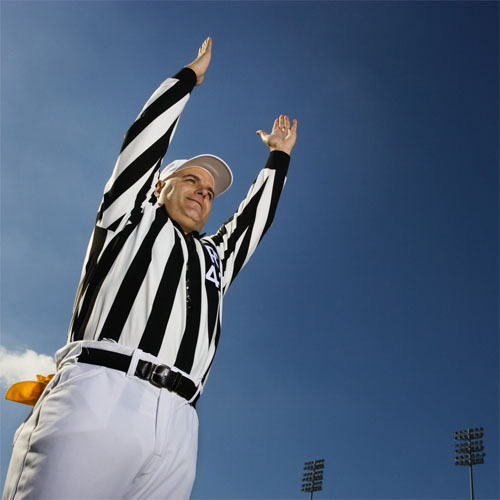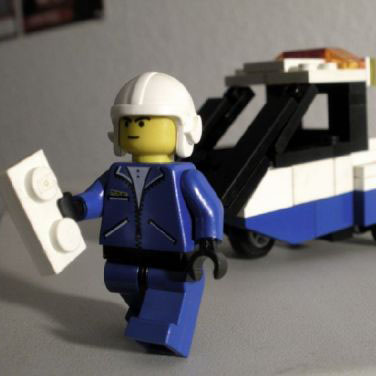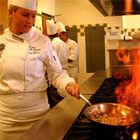
Zebra
Somewhere in, NJ
Male, 62
I've officiated football for over 30 years, now in my 26th on the college level. I've worked NCAA playoffs at the Division II and III level. In addition, I've coached at the scholastic level and have been an educator for over 35 years. I have no interest whatsoever in being an NFL official! Ever!
To the best of my knowledge, that has never happened. And I don't think it should. If you open that can of worms and set a precedent for changing results after the fact from what occurred on the field, there would be no end to the challenges. It would call into question every decision, every call, every outcome. The old saw goes, 'It's a game played by humans and judged by humans'. You have to live with certain things. And as a side note, the official who made the call apparently is publicly saying he was right. Heard that on the radio this morning.
I don't get paid enough to mediate my family's problems. I don't get paid enough to officiate football, either, but I WANT to be there.
Well, if you judge abuse by what the replacement refs were taking, then yes, we take a lot. But look at baseball. Kicking dirt, going nose-to-nose with an umpire. I know coaches/managers can be ejected, but umpires take a lot, probably more than in any sport. A lot of this goes back to communication and control. You need to communicate with the coach about what is going on. They have a job to do and so does the official. The coaches will say a lot, usually about a missed call. But eventually they have to coach. Sometimes they'll keep going and then communicating with them is the key. "Coach, I'll watch for that", or "Coach, I'll find out what the other official saw as soon as I can". If they keep harping, the best thing to say is something like, "Coach, I know you're upset, but if we keep going back to that play, you're going to cause me to miss the next one" or, ultimately, "Coach, we have to move on. that one is over". Many coaches, especially as you move up in level, are pretty smart. They'll come over to you and more quietly say something on-on-one so no one else hears it. And contrary to popular opinion, they really don't question your heritage or parentage. The rule of thumb for officials: if no one else hears it, then it's just between you and the coach. But if he really goes off, and your mom, who you invited to the game and is sitting right behind the team, hears it, then you can flag him for unsportsmanlike conduct. But truthfully it doesn't happen very often.
Uhh, you do agree. There are no "do overs" because officials can't agree. And when push comes to shove, that is why the white hat is there. There will be plays (need I remind you of Seattle-Green Bay) where two officials see it differently (e.g. catch-no catch on a pass that is close to the ground). You confer. Someone has to convince the other. And, as I said, the referee is there to mediate and guide the discussion. On a pass play, for example, the college axiom is 'when in doubt, wipe it out'. But that assumes there is no replay (it's not available at Division II or III) or that there is no clear opinion from both officials. Be assured, there will be a decision.
Meter Maid
 What's the meanest thing anyone's ever said to you?
What's the meanest thing anyone's ever said to you?
Sushi Chef
 Is there a stigma against sushi restaurants that have non-Asian chefs?
Is there a stigma against sushi restaurants that have non-Asian chefs?
Chef
 Has anyone ever found anything gross in their food on your watch?
Has anyone ever found anything gross in their food on your watch?
Good question and very interesting. There is no question that the Monday night game with the controversial ending was a catalyst to get the deal done. But I think the NFL was in a unique position. It is, with some contrary notions, the most popular sport. There is heavy gambling on the NFL (not that the league "worries" about Las Vegas books), so it garners a lot of attention. But not every call made during the lockout was in error. And not every replacement official was bad or didn't belong at that level. You can find very competent replacements - the NFL, as I noted in another posting, did not use highly competent Division 1 officials who MIGHT have done a better job. If the NHL locked out its officials, what kind of outcry would there be? With all due respect to hockey fans everywhere, if an NHL game was messed up by a replacement official, how much would you hear about it? Take it a step further: Major League Soccer?
No. And if I was offered, I certainly hope I would have the character and integrity to say no. And then to turn the person in to the appropriate authorities.
That would make a lot of sense but it would have been a very dicey situation. Many of the D1 conferences use NFL officials as their supervisors of officials (e.g. Big East, Big 10, Big 12, C-USA). If the NFL used officials from those conferences, the officials would be replacing their own supervisors and their supervisors' colleagues on the NFL games. Can you say UGLY?
-OR-
 Login with Facebook
Login with Facebook (max 20 characters - letters, numbers, and underscores only. Note that your username is private, and you have the option to choose an alias when asking questions or hosting a Q&A.)
(A valid e-mail address is required. Your e-mail will not be shared with anyone.)
(min 5 characters)
By checking this box, you acknowledge that you have read and agree to Jobstr.com’s Terms and Privacy Policy.
-OR-
 Register with Facebook
Register with Facebook(Don't worry: you'll be able to choose an alias when asking questions or hosting a Q&A.)